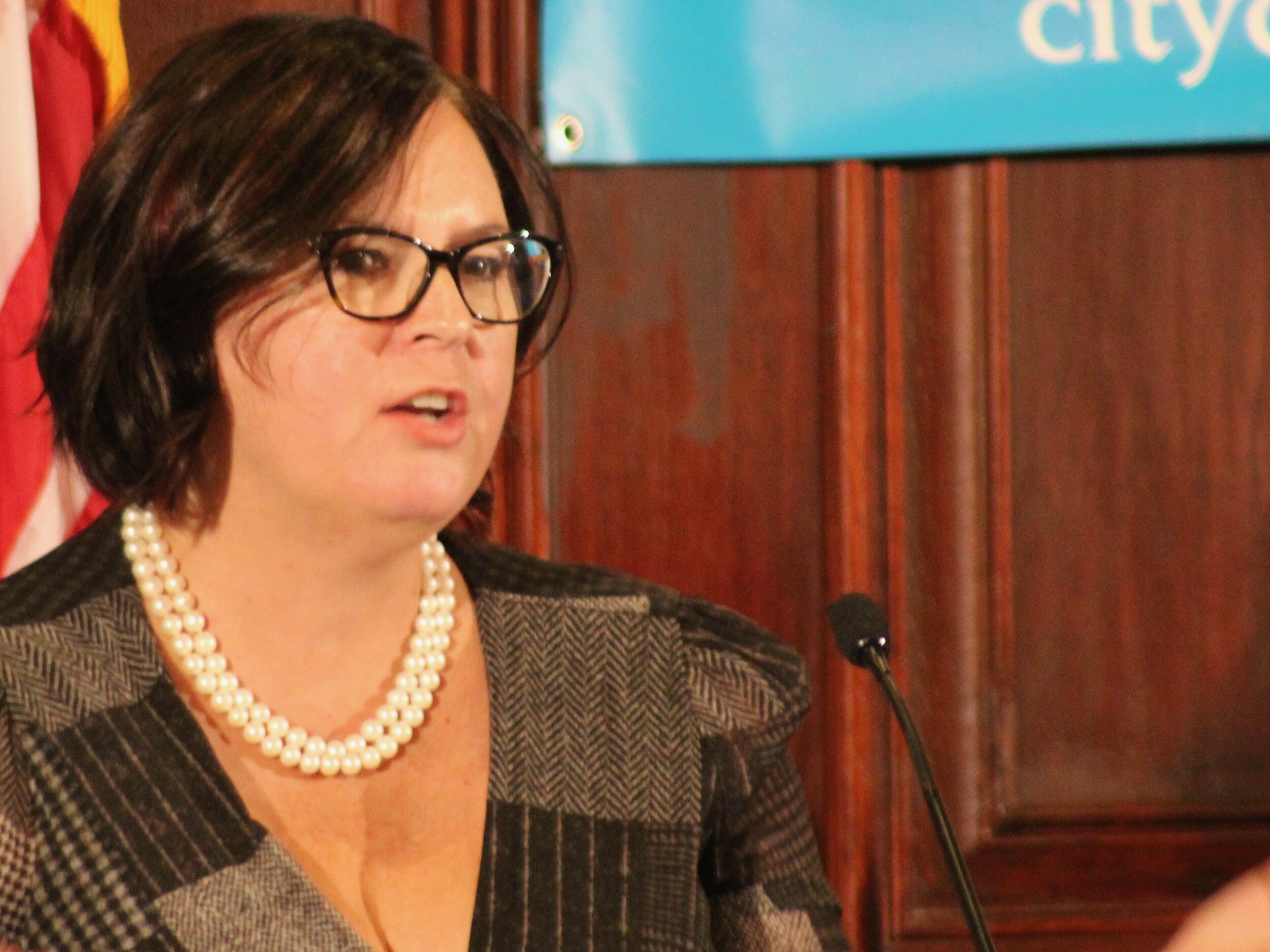Human services still on life support
Comptroller Mendoza says, on long-term costs, funding is not just a moral issue but a common-sense fiscal issue
Andrea Durbin of Illinois Collaboration on Youth, Comptroller Susana Mendoza, and Lauren Wright of Illinois Partners for Human Services address the City Club of Chicago. (One Illinois/Ted Cox)
By Ted Cox
CHICAGO — The state officer who writes the checks for Illinois says funding human-service agencies is not just a moral but a fiscal issue of common sense on the long-term financial costs.
“How do we not pay for it?” Comptroller Susana Mendoza said Thursday at the City Club of Chicago. “We’re already paying for it.”
Mendoza pointed out that, in a cost-benefit analysis, social-service agencies are working to prevent bigger problems that would cost other state agencies more in treatment. She said, for example, that many taxpayers don’t want state money going to “junkies” in drug programs, but if they’re not treated they’re highly likely to wind up in the hospital or prison — with the state footing the bill either way.
Mendoza said that, when it comes to paying the bills for those agencies, “we’re not doing a favor to social services. We are actually helping our bottom line.”
Calling it “a reflection of our moral values,” she added, “To reject them is frankly the sign of a broken moral compass.”
"A healthy human-service sector is essential to a healthy Illinois,” added Andrea Durbin, chief executive officer of Illinois Collaboration on Youth, who joined Mendoza on a three-woman panel at the City Club along with Lauren Wright, executive director of Illinois Partners for Human Services, on the subject of “Illinois Human Services: We’re Not Out of the Woods Yet.”
“A healthy human-service sector is essential to a healthy Illinois.”
Andrea Durbin, head of Illinois Collaboration on Youth (One Illinois/Ted Cox)
That title referred to how social-service agencies bore the brunt of the shortfalls during former Gov. Bruce Rauner’s two-year budget impasse with the General Assembly. Mendoza said that when she took office, at the end of 2016, “Illinois was in fiscal anarchy.” Although under her stewardship, and with the help of a major bond deal and the $40 billon balanced budget passed by new Gov. J.B. Pritzker, she has paid down the state’s backlog of bills from more than $16 billion to $6 billion, human-service agencies were still feeling the residual effects.
“The people who fought the hardest were our state’s human-service providers,” Mendoza said. She called the budget impasse “736 days of hell, and the days that came after that weren’t heaven but purgatory.”
“We have a system-wide workforce crisis,” Durbin said. Lower unemployment and a higher minimum wage might be benefits across the social spectrum, she added, but they were also forcing social agencies to adapt while still trying to recover from the damage done by Rauner.
Durbin said social-service agencies were afflicted with a “really untenable high turnover rate,” as high as 60 percent at some agencies, “and it really hurts the people we’re trying to serve.”
“If we get nothing else right as a government, we should absolutely get right taking care of those worst off,” Mendoza said, “whether it’s the most vulnerable who can’t take care of themselves or folks who just need the help to be self-sufficient.
“Let’s not forget, these services, these providers and what they do, day in and day out, we ask them to do that, as a state,” Mendoza added. “We are asking people to do a job, and then we are leaving them in the lurch when it comes to paying them.”
“Most everybody comes to this work because they care, you know, because it’s mission-driven,” Durbin said. “It’s when we drive them out that the deal is we can’t pay them enough and they don’t feel safe and respected.”
Saying, “Let’s not beat around the bush,” Wright attributed much of the bias against adequately funding human services to “systemic racism,” adding, “The racial disparities are real and they’re not justifiable.”
Mendoza said that the denial rate for various medical treatments in managed care was much higher for African Americans and Latinos than for the general population, with the result being that the state was likely, again, to pick up the bills for the eventual health crisis.
Durbin pointed to Ignite, a Chicago-based agency serving runaways and homeless youth, many of whom are lesbian, gay, bisexual, transsexual, or queer. The Trump administration, she said, had just cut its funding for outreach.
“That kind of street outreach is incredibly important,” she said, for an agency serving kids who oftentimes don’t want to be found or returned home to an abusive environment. In other social agencies, she added, there was “a real chilling effect on people feeling safe enough to reach out for care,” especially among immigrant communities already concerned about Trump’s attempt to impose a “public charge” rule against granting visas to those immigrants who’ve drawn on programs like food stamps or public housing.
All three agreed that passage of Pritzker’s “fair tax” was critical to creating the funding stream that might adequately fund these agencies. A referendum amending the state constitution to allow a graduated income tax will go before voters next November.
“It will be on the ballot next year,” Mendoza said, “when we go to vote for a better president.”


